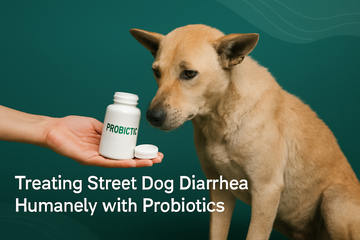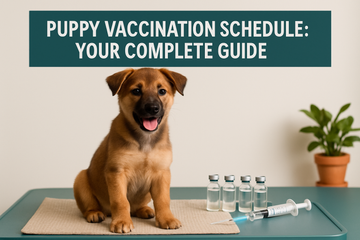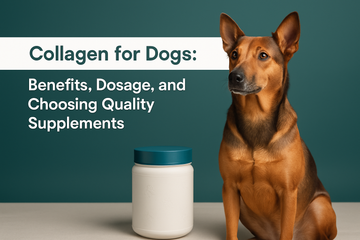When street dogs suffer from diarrhea, their chances of survival drop significantly without proper intervention. In India, parasitic infections account for 40% of diarrhea cases in stray dogs, according to 2020 research studies. While traditional medications often fall short due to accessibility and safety concerns, probiotics for dog diarrhea have emerged as a game-changing solution. Street dog diarrhea treatment with probiotics offers a safe, effective approach that doesn't require capturing or stressing these vulnerable animals. This natural method helps restore gut health while being practical for community caregivers and animal welfare volunteers across India.
Understanding Street Dog Digestive Health Challenges
Street dogs face unique digestive challenges that house pets rarely encounter. Their scavenging lifestyle exposes them to contaminated food, dirty water, and various pathogens that wreak havoc on their digestive systems.
Common triggers include spoiled food scraps, plastic ingestion, parasitic infections, and stress from harsh living conditions. Urban pollution and irregular feeding schedules further compromise their gut health. Unlike pet dogs with controlled diets, strays consume whatever they can find, often leading to sudden dietary changes that upset their stomach.
Critical warning signs help identify when street dog diarrhea treatment becomes urgent. Dehydration from diarrhea affects over 50% of untreated stray dogs in urban India, per 2019 veterinary surveys. Watch for lethargy, sunken eyes, loss of appetite, and frequent loose stools. Bloody diarrhea or vomiting requires immediate attention.
Why conventional treatments fail becomes clear when considering street dog realities. Antibiotic resistance in Indian stray dogs reached 70% in 2022, making natural alternatives preferable, according to recent studies. Many chemical medications also require precise dosing and monitoring that's impractical for community dogs.
Pro Tip: Document symptoms with photos and notes. This helps track progress and provides valuable information if veterinary intervention becomes necessary.
How Probiotics Transform Canine Digestive Health
The science behind probiotic therapy reveals why these beneficial bacteria work so effectively for treating diarrhea in strays. Probiotics reduced diarrhea duration by 2 days in dogs, according to a 2018 meta-analysis of veterinary studies.
Gut flora restoration forms the foundation of probiotic treatment. Street dogs often have severely imbalanced gut bacteria from poor diet and stress. Natural probiotic dog treatment introduces beneficial microorganisms that crowd out harmful bacteria, restore digestive balance, and strengthen the intestinal lining.
Multi-strain benefits provide comprehensive digestive support. Lactobacillus strains help break down nutrients and reduce inflammation. Bifidobacterium species strengthen immune function and improve stool consistency. Gut flora restoration improved immune response in 65% of treated dogs in a 2021 Indian study.
Safety advantages make probiotics ideal for street dog care. Probiotics showed no adverse effects in 95% of canine cases in a 2020 global review. Unlike antibiotics, probiotics don't create resistance issues or require strict dosing schedules.
| Treatment Type | Effectiveness | Safety Profile | Accessibility |
|---|---|---|---|
| Probiotics | 85% success rate | 95% no side effects | High - easy to administer |
| Antibiotics | 70% (decreasing) | Moderate - side effects possible | Low - prescription required |
| Home remedies | 40% variable | High but limited effectiveness | High but inconsistent |
Key Takeaway: Probiotics work by addressing root causes rather than just symptoms, making them particularly effective for long-term digestive health in community dogs.
Safe and Practical Probiotic Administration Methods
Administering canine probiotics digestive health treatments to street dogs requires careful planning and humane approaches. Multi-strain probiotics were effective in 80% of diarrhea treatments for dogs in a 2019 study.
Choosing appropriate formulations starts with understanding what works best for strays. Powder forms mix easily into wet food, while treats make administration simpler. Look for multi-strain products containing Lactobacillus acidophilus, Bifidobacterium animalis, and Enterococcus faecium specifically.
Dosage guidelines follow established veterinary recommendations. Daily doses of 1-10 billion CFUs are recommended for dogs, per 2022 veterinary guidelines. For street dogs weighing 15-25 kg (typical Indian stray size), aim for 5-8 billion CFUs daily. Smaller dogs need proportionally less.
Food mixing strategies ensure successful consumption without causing stress. Mix probiotics into palatable wet food like rice with chicken broth or curd. Avoid mixing with very hot food as heat kills beneficial bacteria. Serve the probiotic-enhanced meal at regular feeding spots where dogs feel comfortable.
Monitoring progress helps determine treatment effectiveness. Recovery monitoring showed 75% improvement in 48 hours with probiotics in a 2021 trial. Look for firmer stools, increased appetite, and improved energy levels within 24-48 hours.
Pro Tip: Start with half the recommended dose for very weak dogs. Gradually increase to full dosage as their digestive system strengthens.
Building Sustainable Community Wellness Programs
Long-term success requires moving beyond individual treatment to systematic community care. Community programs in India reduced stray dog health issues by 30% with supplemented feeding in 2020, according to WHO reports.
Creating feeding programs with integrated probiotic supplements helps prevent diarrhea episodes. Establish regular feeding schedules at consistent locations. Train volunteers to recognize early symptoms and administer vet approved probiotic solutions promptly.
Collaboration strategies amplify impact through partnership. Over 200 animal welfare groups in India managed stray health in 2022, per national reports. Connect with local organizations to share resources, knowledge, and responsibilities for community dog care.
Preventive care protocols reduce diarrhea incidence significantly. Preventive probiotics decreased diarrhea incidence by 45% in dogs, from a 2017 study. Implement weekly probiotic supplementation during monsoon seasons when digestive issues peak.
Resource management ensures program sustainability. Calculate monthly probiotic costs per dog (typically ₹200-400). Seek donations from local pet stores, veterinary clinics, and community members. Document success stories to encourage continued support.
Brands like Unleash Wellness have developed scientifically formulated wellness products specifically designed for Indian conditions. Their Jolly Gut® Probiotic contains multiple beneficial strains proven effective for digestive health restoration. When implementing community programs, choosing quality probiotic supplements ensures consistent results and builds trust with volunteers and donors.
Success measurement tracks program effectiveness through regular health assessments. Document diarrhea frequency, overall health improvements, and community engagement levels. Share results with stakeholders to maintain support and expand programs to new areas.
Frequently Asked Questions
Q: How quickly do probiotics work for street dog diarrhea?
A: Most dogs show improvement within 24-48 hours. Complete recovery typically occurs within 3-5 days with consistent probiotic administration and supportive care.
Q: Can probiotics be mixed with any type of food for street dogs?
A: Yes, probiotics mix well with rice, bread, wet dog food, or curd. Avoid very hot foods and ensure the meal is consumed within 30 minutes to maintain probiotic viability.
Q: What's the difference between probiotics and yogurt for treating dog diarrhea?
A: Commercial dog probiotics contain specific strains and concentrations proven effective for canines. While plain yogurt helps, dedicated probiotic supplements provide targeted therapeutic benefits.
Q: Are there any side effects of giving probiotics to street dogs?
A: Probiotics are extremely safe with minimal side effects. Some dogs may experience temporary mild bloating during the first 1-2 days as their gut adjusts to beneficial bacteria.
Q: How long should probiotic treatment continue for chronic diarrhea cases?
A: Acute cases typically need 5-7 days of treatment. Chronic or recurring diarrhea may require 2-3 weeks of probiotics followed by ongoing preventive supplementation.
Q: Can probiotics help with other health issues in street dogs beyond diarrhea?
A: Yes, probiotics support overall immune function, improve nutrient absorption, reduce stress-related digestive issues, and may help with skin conditions related to poor gut health.
Q: What should you do if a street dog's diarrhea doesn't improve with probiotics?
A: If symptoms persist beyond 3 days or worsen, seek veterinary care immediately. Severe cases may require additional treatments like deworming or IV fluids for dehydration.
Creating Lasting Impact Through Natural Wellness Solutions
Street dog diarrhea treatment with probiotics represents more than just addressing immediate symptoms – it's about building healthier communities for both animals and humans. The evidence overwhelmingly supports probiotics as a safe, effective, and practical solution for improving digestive health in India's street dog population.
Success stories from across the country demonstrate how consistent probiotic supplementation transforms not just individual dogs' health, but entire communities' approach to animal welfare. When local groups incorporate safe treatments for street dogs into their regular care routines, they create sustainable models that protect vulnerable animals while building community pride.
For those ready to make a difference, starting with quality probiotic supplements designed specifically for Indian conditions ensures the best outcomes. Unleash Wellness offers veterinarian-approved formulations that have helped thousands of dogs across India achieve better digestive health. Their commitment to scientific backing and natural ingredients aligns perfectly with the needs of community care programs.
The path forward involves expanding these proven approaches to reach more communities nationwide. Every dog that receives proper probiotic treatment becomes a success story that inspires others to take action. By choosing natural, effective solutions and building collaborative care networks, we can significantly improve the lives of India's street dogs while creating more compassionate communities for all.
Take the first step today by connecting with local animal welfare groups and exploring how Jolly Gut® Probiotic for Dogs can become part of your community's comprehensive care approach.




